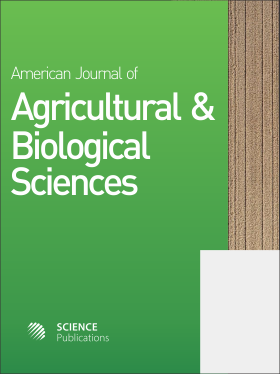Effect of Municipal Solid Waste Compost on the Growth and Production of Vegetable Crops
- 1 Department of Process Engineering and Applied Science, Faculty of Engineering, Dalhousie University, Halifax, Nova Scotia, Canada
- 2 Department of Agricultural Engineering, College of Agriculture and Food Sciences, King Saud University, Riyadh, Saudi Arabia
Abstract
Problem statement: MSW has traditionally been dealt with thorough the practice of land filling and incineration. However, deleterious environmental impacts have promoted municipalities in Canada to recycle non-putrescible wastes and compost the putrescible ones. This study aimed at evaluating the effect of MSW compost on the growth and production of three vegetable crops (potatoes, corn and squash). Approach: Each crop received 5 treatments: MSW1, MSW2, MSW3, NPK and 0.5 NPK, 0.5 MSW1. MSW2 and MSW3 were twice and three times MSW1, respectively. MSW1 was determined for corn and potato based on phosphorous requirements by these crops and the phosphorous content of the MSW compost and was determined for squash based on the nitrogen requirement by the plant and the nitrogen content of the MSW compost. The choice of chemical fertilizer and application rate were based on the optimum NPK ratio for each plant. Samples from the plants were taken at specific growth stages and at harvest for visual health and dry matter analyses. Results: The plant yield for each crop followed the same patterns as those of the visual observations for health ranking and the dry matter. The results showed that 0.5 NPK + 0.5 MSW1 gave the best plant growth, health and yield for potato and corn while NPK gave the best plant growth, heath and yield for squash. Squash did not seem to respond well to MSW compost. Conclusion: The plots that received MSW2 were healthier than those reserved MSW1 and MSW3. High rate of MSW may provide higher level of heavy metals than the plant can tolerate while low rate of MSW may not contain all the other required micro-nutrients. Long tern effects of MSW compost on the chemical and microbiological properties of the soil and the plant properties such as taste, appearance, storability, susceptibility to bugs and disease should be evaluated.
DOI: https://doi.org/10.3844/ajabssp.2010.274.281

- 7,213 Views
- 7,243 Downloads
- 10 Citations
Download
Keywords
- MSW
- compost
- growth
- yield
- potato
- sweet corn
- squash
- heavy metal
